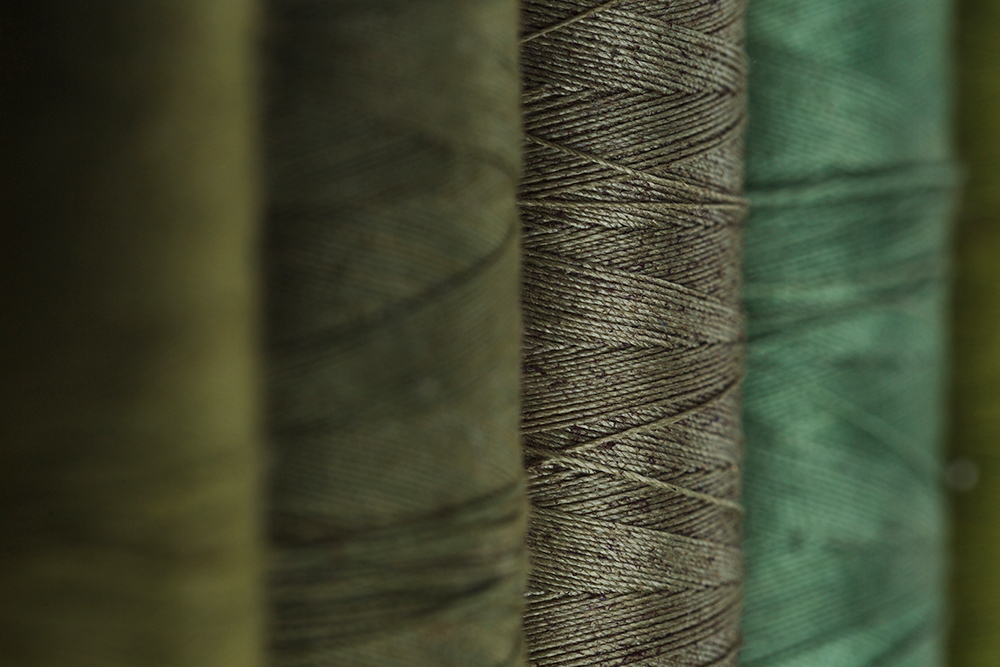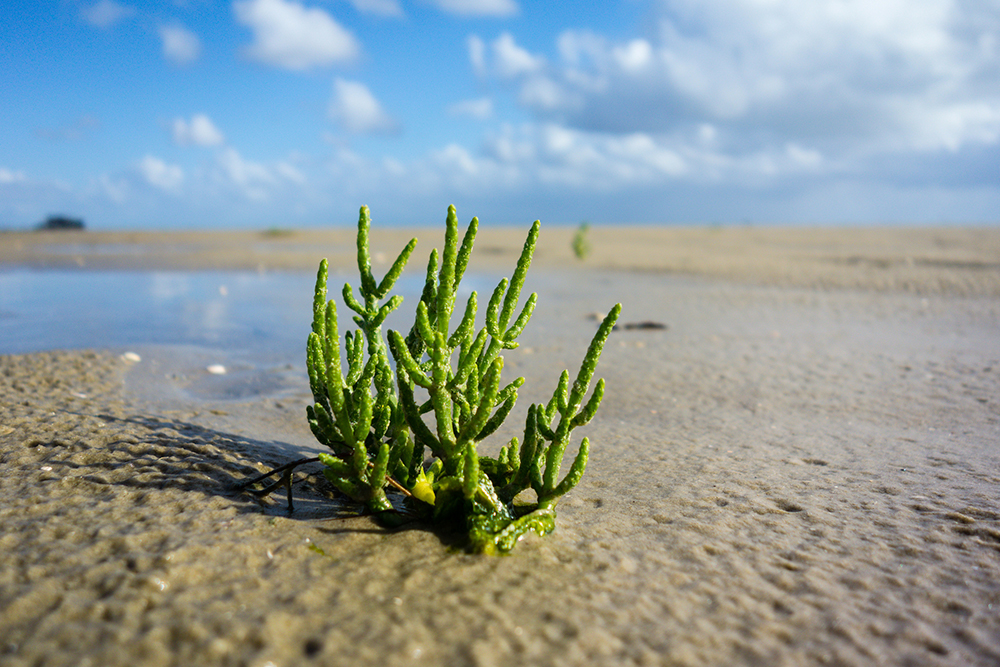Halophyte extraction and lignocellulose fractionation
Empowering sustainable industries
with Halophyte-Based Materials

Circular solutions from salt-tolerant halophyte plants
The HALO-TEX project was conceived in response to the urgent need for sustainable and circular solutions in the textile and biochemical sectors, which face significant environmental and socio-economic challenges. Today, textile production relies heavily on synthetic fibres and imported raw materials such as wool and cotton, these require significant amounts of water, land, and chemicals. Furthermore, practices in these sectors contribute significantly to pollution, climate change, and resource depletion.
To address this issue, HALO-TEX is leading the way towards a circular, bio-based manufacturing model in which halophytes, salt-loving plants that can be grown on low-quality and marginal land not suitable for crops, will be converted into recyclable textiles, bio-based composites, functional additives, and high-value biochemicals. This not only frees up freshwater and agricultural land, it also supports a shift away from the traditional agricultural fibres on which the industry relies to create room for new opportunities for green industrial growth.

HALO-TEX is an EU funded project under the topic HORIZON-CL6-2024-CircBio-02-5-two-stage - Circular design of bio-based processes and products
The Project

The primary aim of HALO-TEX is to develop a sustainable, cost-competitive biorefinery system while working toward realising the objectives of the EU Circular Economy Action Plan and European Green Deal. The study will focus on six technologies for biomass processing and textile innovation, as well as the development of six new bio-based products across a variety of product categories.
HALO-TEX is developing a product information system as part of the project to improve transparency, traceability and trust for consumers when selecting circular bio-based products. The project will encourage cooperation across and between regions and sectors, to benefit vulnerable and rural areas, encourage and support policy objectives, and to foster acceptance from consumers.
At the completion of the project, HALO-TEX will have achieved a replicable model for a circular bio-based economy.
Through a patented, solvent-free extraction system, the project recovers valuable compounds in fibre while preserving the quality of the fibre. This innovative system employs low energy autonomy and creates zero/ waste for the soil that supports soil regeneration, and creates opportunities through circular bioeconomy.
HALO-TEX is working on eco-friendly bio-based additives for textiles and cosmetics using marine plant (halophyte) materials as their new ingredients. Our bio-based additives include UV protecting, lignin particles, flame-resistant nanocellulose and antioxidant plant extracts. We are developing a new category of additives to replace fossil-based materials with safe, effective and sustainable additives.
HALO-TEX is developing recyclable cellulose-based fibres for clothing and home textiles from halophyte biomass. We developed these fibres to advance sorting and reuse and remanufacturing, which are crucial components of circular design and end-of-life options. Advanced sorting technologies will be assessed to facilitate textile-based recycling more efficiently.
HALO-TEX is working on sustainable biocomposites to create textile accessories such as buttons and zippers. They are made using short cellulose fibres as well as bio-based additives. These materials are sustainable substitutes to traditional fillers and offer a strong performance along with compatibility with existing manufacturing processes. The innovation drives sustainability in the textile value chain while minimizing waste.
To foster transparency and traceability throughout the textile value chain, HALO-TEX is developing a secure digital system of product information. This encompasses a Blockchain-based Digital Product Passport (DPP) along with intuitive interfaces which aid users and relevant parties in understanding the product's origins, its components, and sustainability factors. Ease of use is vital for the system's contribution to sustainability, regulatory compliance, and circular economy alongside informed decision-making.
We will evaluate the environmental, social, and economic impacts of the HALO-TEX process through life cycle and techno-economic assessment tools. This will help ensure the process is a safe, sustainable, and economically viable approach. The objective is to limit CO₂ emissions, water and chemical use and improve circularity in textile manufacturing.
We will investigate consumers’ perceptions and acceptance of bio-based textiles and bio-based cosmetic products. Through testing communication techniques and product information, we would encourage trust and enhance market uptake. The objectives of our testing includes obtaining the consumer expectations related to safety, quality, and design.
Circular Biorefinery
HALO-TEX is developing an innovative biorefinery process to convert halophytes into bio-based products. This solvent-free, low-energy process supports circular economy goals and enhances soil health through a zero-waste, sustainable approach.
Transparency and Trust - Digital Product Passport (DPP)
A secure, standards-based digital system ensures full traceability of bio-based products throughout their lifecycle. HALO-TEX promotes trust, sustainability, and an informed decision-making among consumers and manufacturers.
Impacts
The HALO TEX project is set to create significant impacts for different stakeholders, by supporting climate-resilient agriculture, stimulate innovation in bio-based products, and promote responsible consumption. These efforts will foster environmental sustainability, social inclusion, and economic resilience contributing to a circular bioeconomy that benefits both local and global communities.

Biomass producers and landowners
Scientific impacts
Enhanced understanding of soil restoration benefits and potential use and processing of biomass.
Environmental impacts
Promotion of sustainable crops, reduce the need for primary raw materials, restoring productivity of salinized soils and impriove land management.
Social & Economic impacts
Foster economic growth, resilience and improved livelihood for rural communities.
Manufacturing and service industries, Retailers
Scientific impacts
Expertise on bio-based materials, sustainable processing, and consumer preferences for bio-based products.
Environmental impacts
More, sustainable biorefinery processes, bio-based products and eco-friendly consumer habits; and less fossil dependency.
Social & Economic impacts
Improve efficiency and lower production costs; and meet the product demand of eco-conscious consumers.
Communities (urban/rural)
Scientific impacts
Advancements on circular bioeconony supporting systems in rural regions and heavily salinized areas.
Environmental impacts
Adaptation to sustainable raw-material and fresh water use; reduce pollution and increase resilience to climate change impacts.
Social & Economic impacts
Job creation, business opportunities, and sustainable societal development.
Administration and policymakers
Scientific impacts
Evidence-based data on bio-based systems possitive impact and validation of informed policies.
Environmental impacts
Align with EU policy goals, CEAP, and the EG for a better implementation of policies to promote circular bioeconomies.
Social & Economic impacts
Supporting new standards for resource management, and enabling future innovation through new technologies and methods.
Researchers and innovators
Scientific impacts
Knowledge exchange, interdisciplinary research opportunities and cross-sectoral innovation.
Environmental impacts
Contributions to global sustainability goals and societal well-being through innovation.
Social & Economic impacts
Access to new technologies and methodologies for bio-based product development to support future research and innovation.
Consumers and the general public
Scientific impacts
Increase awareness of bio-based products and their life cycle to make informed and environmentally sound choices.
Environmental impacts
Enhanced quality of life through conscious consumption of sustainable goods from the T&C and personal care sectors.
Social & Economic impacts
Increase public access to safe and sustainable products while enabling long-term lower cost .
Methodology

Extraction and lignocellulose fractionation process:
Local halophyte feedstocks will be deliberately processed in order to eliminate salts and extract specific bioactive compounds using a patented, sustainable and environmentally friendly method. Biomass is also treated to separate quality cellulose and lignin. We will develop the conditions in the process to safely and efficiently produce sustainable materials for textiles and cosmetics.
Processing stream conversion to textile additives and cosmetic ingredients:
Plant extracts, high in antioxidants and antimicrobial constituents, are converted into safe, natural formulations for textiles and cosmetics. The latest processing technology ensures that such additives have the appropriate functionality, UV protection, flame-retardancy, and wash resistance. All products are rigorously assessed for safety, performance, and sustainability certified methods.
Cellulose-based (functional) textiles with enhanced recycling:
We develop and optimize cellulose-based yarns for high-quality recyclable textiles from environmentally conscious spinning and knitting processes for recycling. A smart-sorting system further enhances the recyclability of textile waste, thereby enabling recycling with multiple yarns. Also, making new yarns with recovered fibres without chemicals promote even more true circular textile production.
Bio-based composites:
Vegetable cellulose fibers, that are unsuitable for textiles, have become bio-based composites that can be used for accessories. The materials process means they are extruded and made to be strong, durable and cost effective. Performance testing occurs so that the materials can meet standards, and the use of sustainable biopolymers can be expanded.
LCA, social-LCA, TEA, LCC, and SSbD activities:
A comprehensive set of assessments are applied to ensure environmental, social and economic sustainability of bio-based products:
- Life Cycle Assessment (LCA) Social-LCA, and Life Cycle Costing (LCC) assessments which measure carbon footprint, energy usage, environmental impacts, social impacts, and costs over the entire product life cycle according to internationally recognized ISO standards.
- Techno-Economic Assessment (TEA) and process simulations which support assessments for economic feasibility through simulation tools including SimaPro and SuperPro Designer.
- Safe & Sustainable by Design (SSbD) assessment for human and environmental health of products following the EU recommended process to ensure safer products.
- Stakeholder information is gathered from surveys, interviews, and workshops to capture consumer behaviour and societal acceptance within the assessments.
- All our activities are GDPR compliant, respecting data privacy and integrity in all aspects.
Digital product passport:
HALO TEX is developing a secure and interoperable Digital Product Passport (DPP) to ensure transparency and traceability of bio-based products across the value chain. Built on standard-based design and technologies like blockchain, Gaia-X, and the European Blockchain Service Infrastructure, the DPP will store data on material composition, production, life cycle, end-of-life, and compliance with social and environmental standards. It will integrate information from industrial legacy systems and enable access via QR codes and a mobile app. The system includes a secure cloud server with identity, data, and trust layers, ensuring robust data management and connectivity with business systems, while end-to-end cybersecurity safeguards user privacy and data integrity.
Consumer acceptance and perception:
HALO TEX investigates how accessible product information and the sensory qualities of new cellulose-based textiles influence consumer perceptions and behaviors. At WR, this is explored through co-creation sessions with industry stakeholders and laboratory-based experiments. These experiments combine implicit measures, such as facial expression analysis, heart rate monitoring, and skin conductance, with explicit methods, including questionnaires and behavioural tasks in simulated shopping environments. The insights gained will also contribute to the development of the product information system.